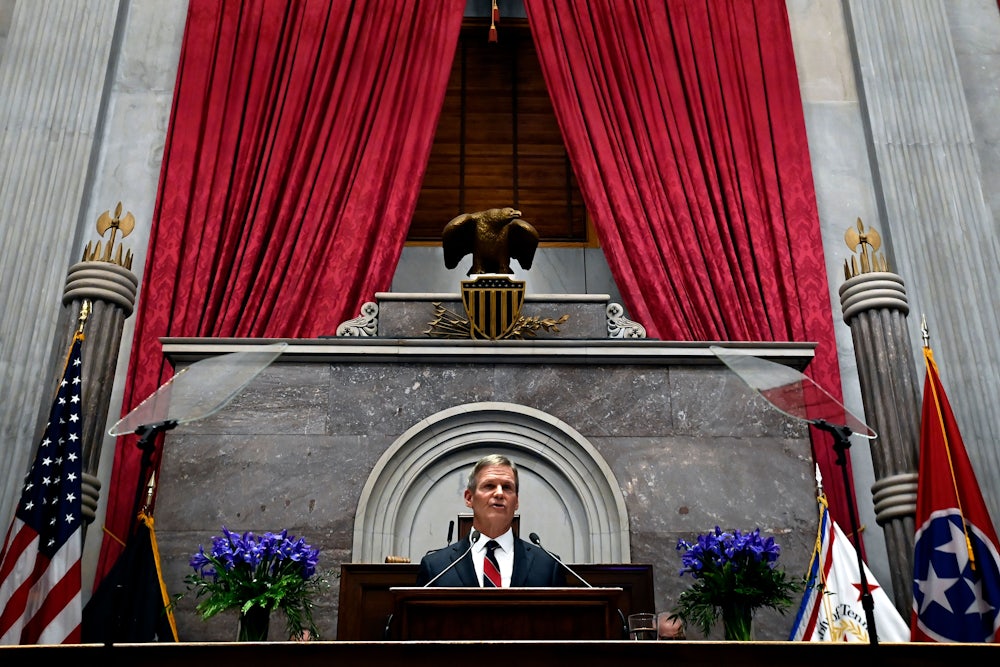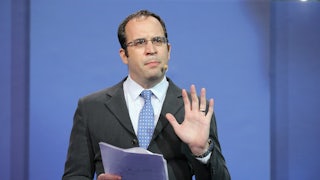In January, the McMinn County Board of Education in Tennessee made headlines nationwide with its decision to remove Art Spiegelman’s graphic novel Maus, an account of the author’s family’s experience in World War II concentration camps, from the local public school curriculum. As journalists and academics criticized the decision, another transformation to the Tennessee education system was attracting far less attention: The state’s Republican governor, Bill Lee, was negotiating plans to open 50 new “classical education” charter schools. An expansion of an initiative associated with Michigan’s Christian Hillsdale College, the schools will follow an educational philosophy that rests on the sanctity of Western literary and theological traditions; administrators promise to direct students’ “souls such that they become men and women who love the right things”—namely “the true, the good, and the beautiful.” The Hillsdale network isn’t alone in its mission to shape students into “a certain kind of human being,” and Tennessee is far from unique in its embrace of this vision. In fact, classical education charters that espouse “character development” and “stewardship of Western tradition” have lately been popping up all around the country, from Oregon to Florida.
In advertisements for Hillsdale Academy, students smile and scribble in plaid uniforms and American flags wave against azure skies. The word “classical” conjures a fantasy of bygone glory awaiting renewal. “Liberal arts education” does not have quite the same appeal, even as the classical schools rely on a liberal arts sequence, the trivium and quadrivium, that dates back centuries. (The trivium, which consists of grammar, logic, and rhetoric, acts as the foundation for the quadrivium, which consists of arithmetic, geometry, music, and astronomy.) Beyond this commonality with liberal arts, approaches to classical education remix elements in varying proportions. Since 1984, Idaho’s private Logos School, in Moscow, has offered “a Classical and Christ-centered education.” Now it offers a remote option. Hillsdale Academy and its Barney Charter Initiative follow in this mold, though instead of explicit religious instruction, they aim for easy franchising. In Arizona and Texas, the Great Hearts charter network promises “the pursuit of Truth, Goodness, and Beauty” through a signature “Humane Letters” sequence. The for-profit Classical Academic Press supplies materials for homeschoolers and advertises a curriculum “grounded in piety, governed by theology,” involving “the deep study of the seven liberal arts.” All schools and offshoots of the movement balance retreat from the public sphere, Christian humanism, and nationalistic exaltation of “Western civilization.”
To promote classical charters, the GOP is rebranding as the party that nourishes human flourishing and intellectualism, inconsistent as this posture may be with its actual policies. The shift demands scrutiny. Adherents to the movement are building an infrastructure that includes conferences, training, and credentialing programs. At the center of this activity is Jeremy Wayne Tate, a podcast host and the CEO of an organization offering an alternative to the SAT and ACT called the Classic Learning Test, or CLT. The movement’s worship of hierarchy is clear in the CLT’s insistence that “the most important exam” should test the “most important ideas, texts, and subjects.” According to Tate, the problem with the College Board, which offers the SAT and AP exams, is that it tries to “censor the entire Christian intellectual tradition.” This complaint is patently absurd—Martin Luther King Jr., to take just one example, appears frequently in SAT prep. The real danger of the College Board, a $1.3 billion business, is its perverse financial incentive to crush the intellectual vitality of students and teachers alike by insisting on the centrality of multiple-choice standardized exams. Far from redressing this problem, the CLT reproduces and builds on it.
The recent wave of “transparency bills,” which, in PEN America’s words, aim to “stifle teaching and learning about race, sex, gender, and American history in schools, universities, and state agencies,” make plain Republicans’ illiberal vision for what good citizenship entails and how to teach it. South Carolina’s transparency bill demands use of Hillsdale materials. Great books reading lists, which many classical charter schools employ, make for easy compliance with intimidating restrictions, such as West Virginia’s, that limit the presentation of “any political, economic, or political-economic system that is based on ideological concepts rooted in or inspired by Marxism, Marxist-Leninism, Maoism, socialism, communism, or so-called critical political theory or critical economic theory, of any form or intellectual tradition whatsoever.” Some evangelists of the classical education movement may be earnest about creating space “to facilitate students to freely learn for themselves while they develop into the person that God created them to be.” But true believers risk giving cover to the construction of an alternate reality in which the suppression of certain threatening stories masquerades as liberation.
Decades ago, philosopher Mortimer J. Adler and English professor E.D. Hirsch promoted educational schemes resting on the notion that there is a central American culture to which all students deserve access. Chester Finn and Michael Petrilli’s 2020 book, How to Educate an American: The Conservative Vision for Tomorrow’s Schools, which regurgitates the worst aspects of these plans, clarifies the broader aims guiding the development of classical charters. The volume’s editors herald “liberation from the technocratic coalition” and proclaim a commitment to “a solid, shared core in everyone’s curriculum.” Never mind that Finn co-authored a book-length advertisement for the College Board three years ago. As the editors now explain, “Conservatives tend to see the human person as a fallen and imperfect being, prone to excess and to sin, and ever in need of self-restraint and moral formation.” Reading lists designed to promote reverence and perfectibility are dangerous because they risk inculcating chauvinism. Efforts to represent American culture as monolithic do injustice to students’ imaginations and to the prospects for pluralism. A fixed canon that shuns writers like Walt Whitman and Aimee Nezhukumatathil will stifle the multiple narratives about what American identity is, does, and could be.
The prospect of publicly funded religious charter education is troubling, and it is understandably tempting for progressives and centrists to reject the movement wholesale. At its worst, it is undoubtedly reactionary, racist, and tribalistic. At the same time, its proponents identify a host of genuine problems. Their solutions may be misguided, but their diagnoses aren’t entirely wrong. Conservatives are right to rethink the relationship between schools and citizenship and to be disillusioned with the College Board’s stranglehold. And they are likewise smart to rethink the alignment between high school and college. Many mainstream champions of the liberal arts focus exclusively on higher education. Frequently, professors view themselves as rescuing students from high school rather than building on it. “Classical education” offers a model of alignment among participating high schools and colleges that helps them get away from the College Board’s metric-obsessed, arid, altogether terrible Advanced Placement program. If we had robust funding for humanities research, perhaps universities could pursue systematic initiatives to bolster public school teachers’ knowledge of and enthusiasm for literature. As it stands, circuit courts agree that public school teachers cede free speech to school boards, and the curricular options from which they choose are often authorized by profit-minded test-makers.
Of course, replacing one form of blind adherence to authority with another—replacing technocracy with a circumscribed set of books blessed by a right-wing Christian consensus—is not the answer. Staking space for pluralism requires dedicated effort. In 1943, Justice Robert Jackson warned of the danger in doctrinal approaches to schooling: “Those who begin coercive elimination of dissent soon find themselves exterminating dissenters. Compulsory unification of opinion achieves only the unanimity of the graveyard.” Whatever the purpose of the humanities at the college level, in high school, reading books together facilitates discussion and community while promoting insight and pleasure. The neoliberal drive to quantify, simplify, and replicate is incompatible with these aims. Despite their claims to the contrary, so are classical charters, which are part of the attack on public education that goes by the name “school choice.” Censorship laws and replication of standardized book lists, in Jackson’s words, impose worrying degrees of “ideological discipline.”
Corrective organizations like Diverse Books and #DisruptTexts promote teaching newer materials that feature a broader range of characters and themes. But renouncing older books in the name of progress risks cultural amnesia. Ralph Ellison’s commentary on the American canon in Invisible Man, too confrontational about race, sex, and communism to appear on classical charter reading lists, suggests an alternative way of grappling with ancestry and heritage. For the narrator, inheritance—familial and cultural—offers the promise of a legible pattern in a chaotic world. By the epilogue’s final pages, the narrator realizes it’s his own responsibility to build on a dense web of influences and develop a unique identity worth acting upon. The narrator is not at peace with his past or with the nation’s—to the contrary, wrestling with both energizes him. As he explains to the reader, “I sell you no phony forgiveness, I’m a desperate man—but too much of your life will be lost, its meaning lost, unless you approach it as much through love as through hate. So I approach it through division. So I denounce and I defend and I hate and I love.” In the novel, hope for democracy rests on a careful examination of the American desire for origins and, ultimately, a rejection of tribalism and ease in favor of deliberation, diversity, and nuance.
If America is going to remain a democratic political community, public education needs to challenge, broaden, and complicate students’ relationships to the country’s traditions and their attendant commitments, not extinguish difference. STEM and vocational programs are important. So are the innumerable true stories about this country’s identity. This is not a job for McKinsey. Public schools need real support—teacher institutes; expanded public humanities initiatives; input from historians, cultural critics, and theorists—in defining and pursuing meaningful education for a broad citizenry. Reductive checklists, dry test prep, a transactional college admissions arms race, and for-profit curricular materials are insufficient to meet the moment. There are myriad ways to theorize, schematize, and teach culture, and we should celebrate those schools doing it thoughtfully. Conservatives are abandoning policy championed by Reagan and then Bush in favor of harrowing new plans for privatization and cultural dominance. But at least they’re talking about books.






